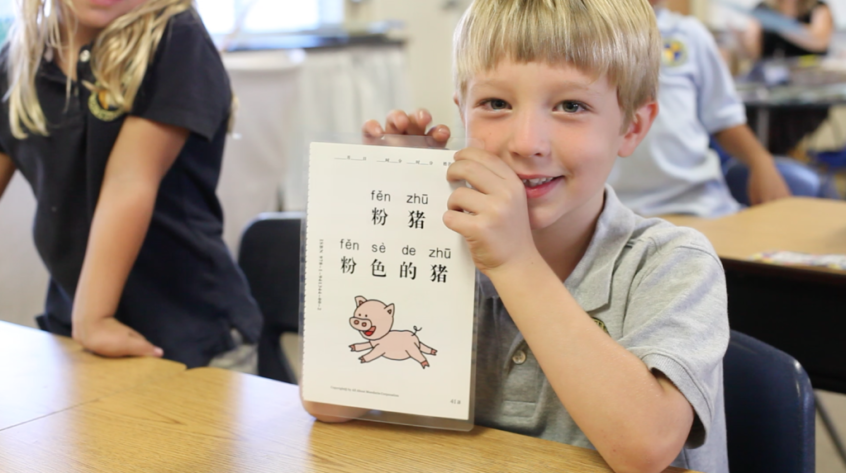 I consider myself so blessed to work for a classical school that not only teaches the classics of the Western tradition but also exposes students to the riches of the Eastern tradition as well. A few years ago, I wrote a post on why one should learn Mandarin in order to support the idea that such is a valuable endeavor. You can read that post here.
I consider myself so blessed to work for a classical school that not only teaches the classics of the Western tradition but also exposes students to the riches of the Eastern tradition as well. A few years ago, I wrote a post on why one should learn Mandarin in order to support the idea that such is a valuable endeavor. You can read that post here.
And, in this post, I would like to provide some tips on how one might go about learning, or helping their child learn, Mandarin, incorporated with classical educational pedagogy. This is neither an exhaustive list nor a professional one—I am still a learner myself and have much to learn—but it is a list of methods that have helped me in my learning of Mandarin.
Festina Lente
 “Make haste slowly” is what this Latin maxim means and if you are familiar with classical educational pedagogy, you know that this refers to the need for students to build careful mastery of a topic before moving ahead too quickly. It is only after the deliberate mastery of crucial, foundational skills has been acquired that true acceleration can take place later.
“Make haste slowly” is what this Latin maxim means and if you are familiar with classical educational pedagogy, you know that this refers to the need for students to build careful mastery of a topic before moving ahead too quickly. It is only after the deliberate mastery of crucial, foundational skills has been acquired that true acceleration can take place later.
Thus, applied to Mandarin, there is no substitute for the students’ daily review of vocabulary, reading learned characters in context, writing by using newly learned words, and speaking Chinese as much as possible. Here are some ways you can encourage your student:
- Students should not rush through their lessons and drills but should practice daily, incrementally, and correctly.
- Students should write out vocabulary cards with the character on one side and the pinyin and translation on the other
- Students should daily drill themselves both ways—character to translation and translation to character, separating out the harder words from the easier and practicing the harder words whenever possible.
- Students should daily prepare for class and pay as much attention to the tone of each new word as they do the character; a different tone may make a different word.
Heads, Hearts, and Hands
Something that The Cambridge School seeks to do is to teach students not only to use their heads or minds but also to use their hearts and hands. One way to do this is to make it practical.
They might go to a Chinese store, market, or restaurant (there are many in the San Diego area) and use what they know to read signs and menus, locate products, and order food. They could find a Chinese friend or acquaintance with whom they can practice what they are learning regularly. Chinese people are so gracious when they know you are making an effort to learn Mandarin! More practically, of course, students should practice what they are learning with their Chinese teachers themselves; they should ask questions and make comments in Chinese as much as possible.
 An interesting opportunity came up through which Cambridge students are able to make contact with Chinese students in China, introduce themselves via postcards, and form pen-pals with these students, putting to use the sentence patterns that they are learning in forging friendships with students on the other side of the world. Through opportunities like these, not only will students learn their Mandarin more deeply but God may also be pleased to open doors for Gospel ministry.
An interesting opportunity came up through which Cambridge students are able to make contact with Chinese students in China, introduce themselves via postcards, and form pen-pals with these students, putting to use the sentence patterns that they are learning in forging friendships with students on the other side of the world. Through opportunities like these, not only will students learn their Mandarin more deeply but God may also be pleased to open doors for Gospel ministry.
Repetitio Mater Memoriae
 Another classical educational pedagogical principle is repetition mater memoriae, “repetition (is) the mother of memory.” This refers to the natural practice of learners to repeat and revisit the things that they love. This is a good thing and students should be encouraged to repeat what they are learning in as many ways and contexts as they can.
Another classical educational pedagogical principle is repetition mater memoriae, “repetition (is) the mother of memory.” This refers to the natural practice of learners to repeat and revisit the things that they love. This is a good thing and students should be encouraged to repeat what they are learning in as many ways and contexts as they can.
Many of these ways have already been mentioned but a couple of other emphases might be shared as well. For instance, people naturally learn through mimesis or imitatio, imitation. This is how Chinese children learn Mandarin in China from their parents; our students should therefore follow suit as much as possible. They should mimic their teachers enthusiastically in class, throw themselves into their lessons, and pronounce words and tones exactly as their teachers do. They should imagine themselves to be Chinese, ask their teacher to give them a Chinese name, act out the part of a Chinese person in their dialogues and sentence pattern practice, adopt natural Chinese speech patterns, etc. It is often said that “practice makes perfect.” Actually, perfect practice makes perfect; students should thus imitate the language just as they hear native speakers speak it and repeat it until it becomes second nature to them.
 In addition, students, particularly classically-educated students, should make use of the rich, classical tradition of songs, chants, and jingles, and sing, chant, and jingle their way through Mandarin. Mandarin, in my opinion, is particularly suited to and pairs well with this tradition, as the tones themselves contribute to a musical quality to the language that helps with memorization, not to mention the myriad chants, puns, and potential for wordplay that Chinese already has at its disposal. Playing with and repeating the language helps the student remember it more effectively. Repetitio mater memoriae.
In addition, students, particularly classically-educated students, should make use of the rich, classical tradition of songs, chants, and jingles, and sing, chant, and jingle their way through Mandarin. Mandarin, in my opinion, is particularly suited to and pairs well with this tradition, as the tones themselves contribute to a musical quality to the language that helps with memorization, not to mention the myriad chants, puns, and potential for wordplay that Chinese already has at its disposal. Playing with and repeating the language helps the student remember it more effectively. Repetitio mater memoriae.
 Mr. Brandon Hoffman holds a Master of Arts degree in Historical Theology from Westminster Seminary California, and a Bachelor of Arts degree with a double emphasis in History and Social Studies Education from Cedarville University. In between pursuing his two degrees, he gained several years’ experience teaching Social Studies at an international school in Tianjin, China, where he was privileged not only to live, work, and immerse himself in Chinese culture and language, but also to teach wonderful groups of diverse students.
[/message_box]
Mr. Brandon Hoffman holds a Master of Arts degree in Historical Theology from Westminster Seminary California, and a Bachelor of Arts degree with a double emphasis in History and Social Studies Education from Cedarville University. In between pursuing his two degrees, he gained several years’ experience teaching Social Studies at an international school in Tianjin, China, where he was privileged not only to live, work, and immerse himself in Chinese culture and language, but also to teach wonderful groups of diverse students.
[/message_box]
